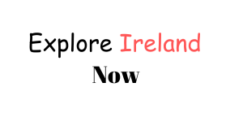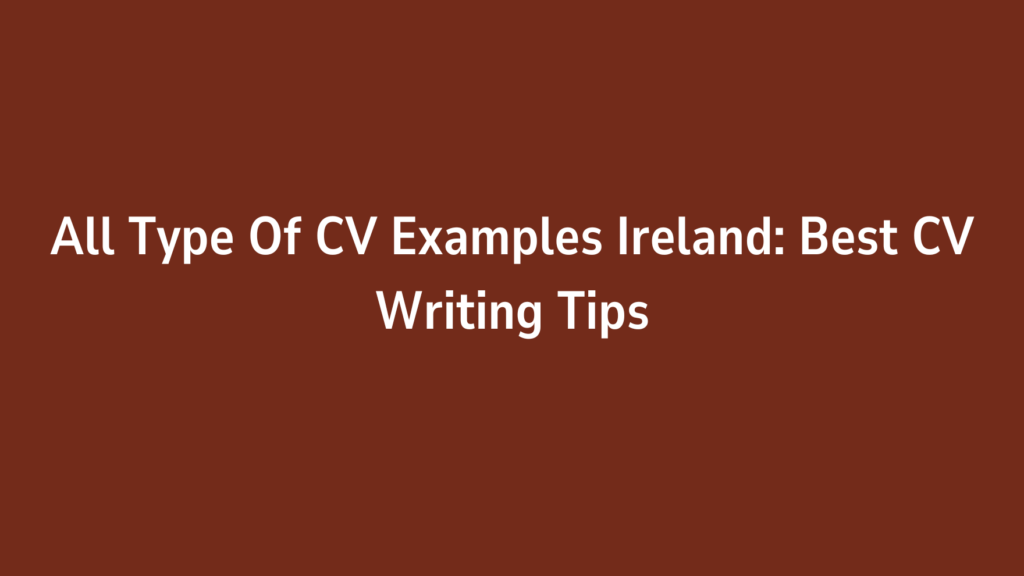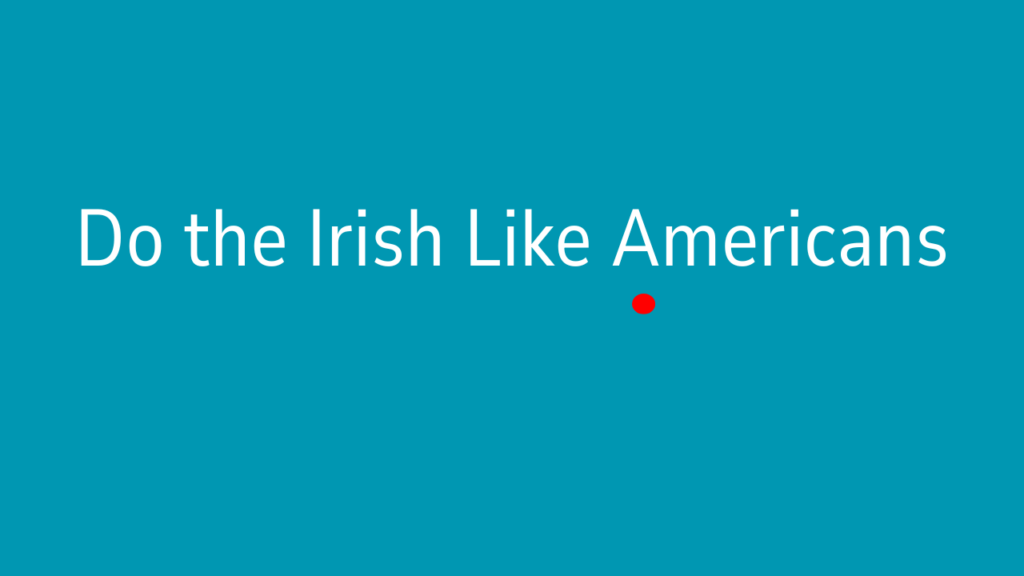Ireland, often referred to as the “Emerald Isle,” is a country known for its lush landscapes, rich history, and vibrant culture. But beyond its scenic beauty and cultural heritage, Ireland is also a land of opportunity, especially for Americans looking to work abroad. Whether you’re drawn to Ireland for its friendly people, its thriving economy, or its proximity to other European destinations, there are plenty of job opportunities waiting for you.
In this article, we’ll explore everything you need to know about finding jobs in Ireland as an American. We’ll cover the types of jobs available, the visa requirements, the cost of living, and much more. By the end of this guide, you’ll have a clear understanding of what it takes to work in Ireland and how to make the most of your experience.
Why Work in Ireland?
Ireland is a popular destination for Americans looking to work abroad, and for good reason. Here are some of the top reasons why you should consider working in Ireland:
- English-Speaking Country: Ireland is an English-speaking country, which makes it easier for Americans to communicate and integrate into the workplace.
- Strong Economy: Ireland has a strong and growing economy, with a particular focus on industries like technology, pharmaceuticals, and finance. Many multinational companies have their European headquarters in Ireland, providing ample job opportunities.
- Cultural Similarities: Ireland and the United States share many cultural similarities, making it easier for Americans to adapt to life in Ireland.
- Beautiful Landscapes: Ireland is known for its stunning landscapes, from the Cliffs of Moher to the rolling hills of the countryside. Working in Ireland gives you the chance to explore these natural wonders.
- Proximity to Europe: Ireland’s location makes it a great base for exploring other European countries. With affordable flights and short travel times, you can easily visit cities like London, Paris, and Rome.
2. Types of Jobs Available for Americans in Ireland
Ireland offers a wide range of job opportunities for Americans, particularly in industries where there is a high demand for skilled workers. Here are some of the most common types of jobs available:
A. Technology and IT Jobs
Ireland is often referred to as the “Silicon Valley of Europe” due to the large number of tech companies that have set up shop in the country. Some of the biggest names in tech, such as Google, Facebook, and Apple, have their European headquarters in Ireland. This has created a high demand for skilled workers in the technology and IT sectors.
- Software Developer
- Data Analyst
- IT Project Manager
- Cybersecurity Specialist
- Web Designer
| Job Title | Average Salary Range (EUR) |
|---|---|
| Software Developer | €40,000 – €70,000 |
| Data Analyst | €35,000 – €60,000 |
| IT Project Manager | €50,000 – €90,000 |
| Cybersecurity Specialist | €45,000 – €80,000 |
| Web Designer | €30,000 – €55,000 |
B. Pharmaceutical and Healthcare Jobs
Ireland is home to some of the world’s leading pharmaceutical companies, including Pfizer, Johnson & Johnson, and Novartis. The healthcare sector is also growing, with a demand for both medical professionals and support staff.
- Pharmacist
- Biomedical Engineer
- Nurse
- Medical Researcher
- Healthcare Administrator
| Job Title | Average Salary Range (EUR) |
|---|---|
| Pharmacist | €50,000 – €80,000 |
| Biomedical Engineer | €40,000 – €70,000 |
| Nurse | €30,000 – €50,000 |
| Medical Researcher | €35,000 – €60,000 |
| Healthcare Administrator | €40,000 – €65,000 |
C. Finance and Accounting Jobs
Dublin, Ireland’s capital, is a major financial hub and home to many international banks and financial institutions. This has created a demand for professionals in the finance and accounting sectors.
- Accountant
- Financial Analyst
- Investment Banker
- Auditor
- Tax Consultant
| Job Title | Average Salary Range (EUR) |
|---|---|
| Accountant | €35,000 – €60,000 |
| Financial Analyst | €40,000 – €70,000 |
| Investment Banker | €60,000 – €120,000 |
| Auditor | €40,000 – €65,000 |
| Tax Consultant | €45,000 – €75,000 |
D. Education and Teaching Jobs
If you have a background in education, there are opportunities to teach in Ireland, particularly in English language schools and international schools.
- English Teacher
- Primary/Secondary School Teacher
- University Lecturer
- Special Education Teacher
- Tutor
| Job Title | Average Salary Range (EUR) |
|---|---|
| English Teacher | €25,000 – €40,000 |
| Primary/Secondary School Teacher | €35,000 – €60,000 |
| University Lecturer | €50,000 – €80,000 |
| Special Education Teacher | €30,000 – €50,000 |
| Tutor | €20,000 – €35,000 |
E. Hospitality and Tourism Jobs
Ireland’s tourism industry is booming, and there is a constant demand for workers in the hospitality sector. This is a great option for those who enjoy working with people and want to experience Ireland’s vibrant culture.
- Hotel Manager
- Tour Guide
- Chef
- Event Coordinator
- Bartender
| Job Title | Average Salary Range (EUR) |
|---|---|
| Hotel Manager | €35,000 – €60,000 |
| Tour Guide | €20,000 – €35,000 |
| Chef | €25,000 – €45,000 |
| Event Coordinator | €30,000 – €50,000 |
| Bartender | €18,000 – €30,000 |
F. Creative and Media Jobs
Ireland has a thriving creative industry, with opportunities in film, television, music, and the arts. Dublin and Galway are particularly known for their creative scenes.
- Graphic Designer
- Journalist
- Photographer
| Job Title | Average Salary Range (EUR) |
|---|---|
| Graphic Designer | €30,000 – €50,000 |
| Journalist | €25,000 – €45,000 |
| Photographer | €20,000 – €40,000 |
3. Visa Requirements for Americans Working in Ireland
Before you can start working in Ireland, you’ll need to obtain the appropriate visa. The type of visa you need will depend on the length of your stay and the type of work you’ll be doing.
A. Short-Term Work Visas
If you’re planning to work in Ireland for less than 90 days, you may be able to do so without a visa, depending on your nationality. However, Americans will need to apply for a Short-Stay ‘C’ Visa if they plan to work during their stay.
B. Long-Term Work Visas
For those planning to work in Ireland for more than 90 days, you’ll need to apply for a Long-Stay ‘D’ Visa. There are several types of long-term work visas available, including:
- Critical Skills Employment Permit: This visa is for highly skilled workers in occupations where there is a shortage of talent in Ireland.
- General Employment Permit: This visa is for jobs that are not on the Critical Skills Occupations List but are still in demand.
- Intra-Company Transfer Permit: This visa is for employees of multinational companies who are being transferred to an Irish branch.
- Dependent/Spousal Work Permit: If your spouse is working in Ireland, you may be eligible for a work permit that allows you to work as well.
C. Working Holiday Visa
Americans between the ages of 18 and 35 may be eligible for a Working Holiday Visa, which allows you to work and travel in Ireland for up to 12 months. This is a great option for those who want to experience Ireland while earning money to support their travels.
4. How to Find a Job in Ireland
Finding a job in Ireland as an American may seem daunting, but with the right approach, it can be a smooth process. Here are some steps to help you get started:
A. Research the Job Market
Before you start applying for jobs, it’s important to research the Irish job market to understand which industries are hiring and what skills are in demand. Websites like Indeed.ie, IrishJobs.ie, and Jobs.ie are great resources for job seekers.
B. Tailor Your CV and Cover Letter
In Ireland, a CV (curriculum vitae) is similar to a resume in the United States, but there are some differences in format and content. Make sure your CV is tailored to the Irish job market and includes relevant work experience, education, and skills.
C. Network
Networking is key to finding a job in Ireland. Attend job fairs, join professional organizations, and connect with people in your industry on LinkedIn. The more connections you make, the better your chances of finding a job.
D. Apply for Jobs
Once you’ve identified potential job opportunities, start applying. Be sure to follow the application instructions carefully and submit all required documents.
E. Prepare for Interviews
If you’re invited for an interview, take the time to prepare. Research the company, practice common interview questions, and be ready to discuss your qualifications and experience.
5. Cost of Living in Ireland
The cost of living in Ireland can vary depending on where you live and your lifestyle. Here’s a breakdown of some of the main expenses you’ll encounter:
A. Housing
Housing is one of the biggest expenses in Ireland, particularly in cities like Dublin and Cork. Here are some average rental prices:
| City | Average Monthly Rent (1-Bedroom Apartment) |
|---|---|
| Dublin | €1,500 – €2,000 |
| Cork | €1,200 – €1,500 |
| Galway | €1,000 – €1,300 |
| Limerick | €900 – €1,200 |
B. Transportation
Public transportation in Ireland is reliable and affordable. A monthly public transport pass in Dublin costs around €120, while a single bus or train ticket typically costs between €2 and €3.
C. Food and Groceries
The cost of food and groceries in Ireland is comparable to other European countries. Here are some average prices:
| Item | Average Cost |
|---|---|
| Milk (1 liter) | €1.00 |
| Bread (loaf) | €1.50 |
| Eggs (12) | €2.50 |
| Chicken (1 kg) | €8.00 |
| Apples (1 kg) | €2.00 |
D. Healthcare
Ireland has a public healthcare system, but many people also opt for private health insurance. The cost of private health insurance can range from €50 to €200 per month, depending on the level of coverage.
6. Work Culture in Ireland
Understanding the work culture in Ireland is important for Americans who are planning to work there. Here are some key aspects of Irish work culture:
- Work-Life Balance: The Irish value work-life balance, and it’s common for employees to have flexible working hours and generous vacation time.
- Punctuality: Punctuality is important in the Irish workplace, so be sure to arrive on time for meetings and appointments.
- Communication: The Irish are known for their friendly and informal communication style. It’s common to use humor and small talk in the workplace.
- Hierarchy: While there is a hierarchy in Irish workplaces, it’s generally less formal than in some other countries. Managers are often approachable and open to feedback.
- Teamwork: Collaboration and teamwork are highly valued in Irish workplaces. Be prepared to work closely with your colleagues and contribute to group projects.
7. Tips for Americans Moving to Ireland
Moving to a new country can be both exciting and challenging. Here are some tips to help you make the transition to life in Ireland as smooth as possible:
A. Learn About Irish Culture
Take the time to learn about Irish culture, traditions, and customs. This will help you better understand and connect with the people you meet.
B. Get to Know the Local Area
Once you arrive in Ireland, take the time to explore your local area. Visit nearby towns, try local restaurants, and get to know your neighbors.
C. Open a Bank Account
Opening a bank account in Ireland will make it easier to manage your finances. Be sure to bring your passport, proof of address, and any other required documents.
D. Stay Connected
Stay in touch with friends and family back home, but also make an effort to build a social network in Ireland. Join local clubs, attend community events, and make new friends.
E. Be Patient
Moving to a new country can be overwhelming at times, so be patient with yourself as you adjust to your new surroundings. It may take some time to feel fully settled, but with time, you’ll feel right at home.
Frequently Asked Questions (FAQs) About Jobs in Ireland for Americans
If you’re an American considering working in Ireland, you likely have many questions about the process, requirements, and what to expect. Below, we’ve compiled a list of frequently asked questions to help you navigate your journey.
1. Can Americans work in Ireland without a visa?
- Answer: No, Americans cannot work in Ireland without a visa. If you plan to work for less than 90 days, you’ll need a Short-Stay ‘C’ Visa. For longer stays, you’ll need a Long-Stay ‘D’ Visa or a Working Holiday Visa for those who want to experience Ireland while earning money to support their travels.
2. What is the average salary in Ireland?
- Answer: The average salary in Ireland varies by industry. For example:
- Technology Jobs: €40,000 – €90,000
- Healthcare Jobs: €30,000 – €80,000
- Finance Jobs: €35,000 – €120,000
- Hospitality Jobs: €18,000 – €60,000
3. How long does it take to get a work visa for Ireland?
- Answer: The processing time for a work visa can take 8-12 weeks, depending on the type of visa and the completeness of your application.
4. What is the cost of living in Ireland?
- Answer: The cost of living in Ireland includes:
- Housing: €900 – €2,000/month
- Transportation: €120/month for a public transport pass
- Groceries: €200 – €400/month
- Healthcare: €50 – €200/month for private insurance
5. Is it easy for Americans to find jobs in Ireland?
- Answer: Yes, especially in high-demand sectors like technology, healthcare, and finance. Networking and tailoring your CV to the Irish job market can improve your chances.
6. Do I need a job offer to apply for a work visa?
- Answer: Yes, for most work visas (e.g., Critical Skills Employment Permit, General Employment Permit), you need a job offer from an Irish employer.
7. What is the Working Holiday Visa, and who is eligible?
- Answer: The Working Holiday Visa allows Americans aged 18-35 to work and travel in Ireland for up to 12 months. It’s a great option for those who want to experience Ireland while earning money to support their travels.
8. What is the work culture like in Ireland?
- Answer: Irish work culture values work-life balance, punctuality, teamwork, and friendly communication. Managers are approachable, and collaboration is key.
9. Can I bring my family to Ireland while I work?
- Answer: Yes, if you have a long-term work visa, your spouse and dependent children can join you. Your spouse may also be eligible for a Dependent/Spousal Work Permit.
10. What are the most in-demand jobs in Ireland?
- Answer: The most in-demand jobs include:
- Technology: Software Developers, Data Analysts
- Healthcare: Nurses, Pharmacists
- Finance: Accountants, Financial Analysts
- Hospitality: Chefs, Hotel Managers
11. How do I find a job in Ireland as an American?
- Answer: Steps include:
- Researching the job market on sites like Indeed.ie and IrishJobs.ie
- Tailoring your CV and cover letter
- Networking through LinkedIn and job fairs
- Applying for jobs and preparing for interviews
12. What is the tax rate in Ireland?
- Answer: Ireland’s income tax rates are:
- 20% on income up to €40,000
- 40% on income above €40,000
13. Can I work remotely for a U.S. company while living in Ireland?
- Answer: Yes, but you’ll need to comply with Irish tax laws and may require a Stamp 0 Visa or Critical Skills Employment Permit if working for an Irish company.
14. What is the healthcare system like in Ireland?
- Answer: Ireland has a public healthcare system, but many expats opt for private health insurance, costing €50-€200/month, for better coverage.
15. What are the best cities in Ireland for jobs?
- Answer: The best cities include:
- Dublin: Tech and finance hub
- Cork: Pharmaceuticals and manufacturing
- Galway: Creative industries and tourism
- Limerick: Engineering and education
16. How do I open a bank account in Ireland?
- Answer: To open a bank account, you’ll need:
- Your passport
- Proof of address (e.g., utility bill)
- Proof of employment or visa status
17. What is the minimum wage in Ireland?
- Answer: As of 2023, the minimum wage in Ireland is €11.30 per hour.
18. Can I apply for permanent residency in Ireland?
- Answer: Yes, after legally working and living in Ireland for 5 years, you may be eligible to apply for permanent residency.
19. What is the best way to network in Ireland?
- Answer: Attend industry events, join professional organizations, and connect with people on LinkedIn. Networking is key to finding jobs in Ireland.
20. Is it expensive to live in Ireland?
- Answer: Ireland can be expensive, especially in cities like Dublin. However, salaries in high-demand sectors often offset the cost of living.
8. Conclusion
Working in Ireland as an American can be a rewarding and enriching experience. With its strong economy, friendly people, and beautiful landscapes, Ireland offers a unique opportunity to live and work in a vibrant and welcoming country.
So, if you’re ready to take the leap and start a new chapter in your life, consider Ireland as your next destination. With the right preparation and mindset, you’ll find that working in Ireland can be an unforgettable experience.

Hi, I’m Tanvir, the founder and author of Explore Ireland Now. With a deep love for Ireland and its rich culture, history, and landscapes, I created this site to share everything that makes this beautiful country worth exploring. Whether you’re a local looking for hidden gems or a traveler planning your next adventure, I provide insightful guides, tips, and recommendations to help you experience Ireland to the fullest.
From stunning landscapes to vibrant cities and quaint villages, Ireland is full of wonders waiting to be discovered. Through my personal experiences and research, I aim to bring you the most up-to-date information and inspiration for your journey.
Thank you for visiting Explore Ireland Now—I hope my content helps you uncover all that this incredible country has to offer! If you have any questions or need travel advice, feel free to reach out.



